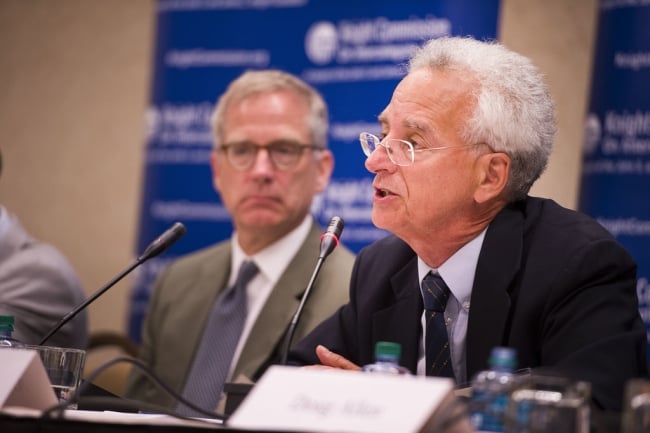You have /5 articles left.
Sign up for a free account or log in.

Andrew Zimbalist, a professor of economics at Smith College, discusses the Ed O'Bannon lawsuit at a Knight Commission on Intercollegiate Athletics meeting.
Knight Commission on Intercollegiate Athletics
WASHINGTON -- The former president of Northwestern University said Tuesday that if the university was forced to consider college athletes as employees, he hopes Northwestern would leave big-time colleges sports behind.
“What does paid athletics have to do with the university mission?” said Henry Bienen, who retired as Northwestern’s president in 2009. “If at some point you go down that slope and you’re all the way down that slope, I think you’ll see a bailing of lots of private and even some public universities. At least I hope so.”
The comments came Tuesday during a discussion organized by the Knight Commission on Intercollegiate Athletics, of which Bienen is a member. They also came as Northwestern awaits a National Labor Relations Board decision that would decide if its football players -- and college athletes at private colleges, more generally -- could unionize as employees of the university.
The National Collegiate Athletic Association, which is currently fighting several battles to halt the professionalization of college sports, has said that the decision could have a “significant and irreversible, negative impact on the future of intercollegiate athletics and higher education in the United States.”
Others involved in college athletics have also recently said that private institutions should opt out of major college sports if the NLRB rules in the football players’ favor.
In an article that appeared in Stanford University’s alumni magazine in September, both Stanford’s president and athletics director said paying athletes would turn private college athletics into professional minor leagues and force institutions like Stanford to cut more Olympic sports. “Why be involved in it?” John Hennessy, Stanford’s president, said.
Bienen brought up Hennessy’s comments during Tuesday’s meeting, which was focused on the implications of the Ed O’Bannon lawsuit. In August, a federal judge ruled in that case that the NCAA’s name and likeness rules violate federal antitrust law. The NCAA is appealing the decision.
The panelists on Tuesday discussed a number of issues pertaining to the ruling, including potential models for allowing college athletes to profit off their names and likeness, and how the NCAA could -- or if it should -- be granted an antitrust exemption.
Lorry Spitzer, a tax lawyer and adjunct professor at Boston College Law School, said that while many within college sports disagree with the O’Bannon ruling, conversations like those that took place at the meeting on Tuesday continue to be about how to make the O’Bannon decision work within the current NCAA amateurism framework.
That’s a more difficult conversation to have when weighing the implications of the NLRB’s decision, the panelists said, or the effects of another recent lawsuit brought against the NCAA by a former Clemson University football player named Martin Jenkins.
“[The O’Bannon decision] is not like the end of the world as we know it,” Spitzer said. “Whereas the Jenkins lawsuit or the NLRB decision really would end the world as we know it. It’s very hard to see how amateur athletics would exist with those in place.”
In spring 2014, Northwestern football players approached the Chicago regional office of the labor board about forming a union. The director of the office, Peter Sung Ohr, ruled that, under the National Labor Relations Act, scholarship football players at private universities are employees. Ohr said walk-on players -- those without scholarships -- do not qualify.
The university appealed the decision to the National Labor Relations Board, urging the board to reverse the regional director’s decision.
In amicus briefs filed in July, the university's argument was backed by at least eight other private colleges, six Republican members of Congress and the NCAA. The NLRB has still not made a final decision in the case.
During the Knight Commission meeting, Andrew Zimbalist, a professor of economics at Smith College, said that even though the NLRB decision would force olny private colleges to allow players to unionize, the ruling would have a ripple effect across all of big-time college sports.
“If a handful of [private college athletes] were to unionize and bargain for better benefits and maybe even bargain for salaries, then what will happen throughout the conference and other schools is that they’ll have to match the private school’s benefits and the whole compensation package,” Zimbalist said. “So it will have sweeping implications for the whole model.”
The Jenkins lawsuit, the panelists said, has the potential to be even more sweeping.
The suit, which is still seeking class action status from the same judge who ruled in the O’Bannon case, is much broader than previous antitrust lawsuits against the NCAA. It focuses not just on issues of name and likeness or full cost of attendance, but on unlimited compensation.
It seeks to completely upend the NCAA’s theoretical amateurism model.
“It’s really the elephant in the room,” Doug Allen, a former football player and professor of labor and employment relations at Pennsylvania State University, said. “Forget about O’Bannon. Jenkins isn’t going away.”




